Give the Gift of an OW Profile

Last year I added a spoiler alert to the Christmas blog post I wrote for Ordain Women. Basically, I said, it’s been my experience that Santa brings us gifts regardless of whether we’re naughty or nice. They’re freely given, no strings attached, unconditional.
Christmas celebrates an invitation to participate, warts and all, in the miraculous generosity of a God who doesn’t horde love or power but shares both liberally. Unfortunately, we’re often not as generous as the God we worship, particularly when it comes to sharing power. We tend to guard access to it as if it were in short supply, refusing to acknowledge that only power used to empower others is limitless and everlasting. Sharing power is essential to amplifying it. This is the message of Mormonism—except when it comes to empowering women.
A friend once noted that there was simply no place for a woman, born with the talents of Moses, to use her gifts in the LDS Church. Similarly, a female financial wiz presently can’t even count a ward’s tithing, nor can a gifted psychologist, barred from becoming a bishop, use her considerable skills in pastoral counseling. This has to change. Why not help others understand that there is simply no reason to leave untapped the countless talents, abilities, and aspirations that could be shared more readily, if the Church opened priesthood ordination to women and empowered them within the institution to use their gifts in full measure?
An Ordain Women profile is a concise, thoughtful statement on what the ordination of women would mean to you personally and/or for the institutional Church. It is a gift of yearning and hope for a religious community that better reflects the radical inclusiveness of Christ’s message. OW welcomes submissions from those who are faithful Mormons, those who might return to the Church but for gender inequality, or those who care deeply about the LDS Church and its members and are concerned about how gender inequality and the marginalization of women negatively affect all of us.
Isn’t this season of gift giving the perfect time to share the gift of an Ordain Women profile?
Dear Guy in Your Thinking Place

Dear Guy in Your Thinking Place,
You don’t know me, but I read with interest your recent blog post postulating several theories for why women don’t have the Priesthood in Mormonism. I have thought long and hard about your ideas and I have some questions.
In your example of a boy being sad because he’s too small to play football, you describe an individual who, due to his physical differences and inadequacies, is left out of something. So, my first question is: Do you believe that women, as a group, lack some capacity or ability to hold the Priesthood? If you do, then I should probably stop writing. But if you do not, then I can only wonder why you would compare an individual’s sadness at not being well suited for something to an entire category of people being systematically excluded from something.
Next, you claim that “in our search to understand equality and God, we have to consider what the Priesthood gives, and what the absence of the Priesthood gives as well.” So, my question is: Are we better off with more than half of our people not fully participating? And as a follow-up, I would also ask: Are members better off in branches because there aren’t enough Priesthood holding men in a ward area? Are men better off carrying the burden and responsibilities of Priesthood to bring about the kingdom of God without the equal yoking of women to help them? I don’t think we are. The absence of Priesthood gives us nothing.
When you discuss the current view of the Priesthood you present a quick history of who has and has not held the Priesthood keys. I’m going to assume that you don’t believe women are, collectively, in a state of apostasy and so that can’t be why we are excluded from Priesthood authority. Having made that statement, I thank you for pointing out that the trend over history—both ancient and recent—has been a move from exclusion to expansion; the ability to hold Priesthood authority has expanded from Jew to Gentiles, from adult men to 12-year-old boys, from a racial exclusion to equal access regardless of color. So my question is as follows: Wouldn’t expansion of Priesthood authority for women be the next logical step? The idea that the expansion should stop now does not square with history, and it runs contrary to the promises in the 9th Article of Faith.
In your attempt to address the Motherhood = Priesthood argument that is so often rendered, you call it “apples and oranges to refute this statement by comparing childbirth to blessing a child because it takes the hardest part of being a mother (the low point) and compares it to a baby’s blessing (the high point) of the Priesthood.” First, let me say that I have been heavily involved in this debate for almost five years and I have never heard anyone refute the Motherhood = Priesthood equivalency with that argument. And it’s unfortunate that you focus on this because the bone of contention with the equivalency isn’t the high/low comparison; it is that comparing Motherhood to Priesthood is like apples and Oldsmobiles. My question to you is: Do you believe that fatherhood is important? I only ask because for most people, motherhood is equal to fatherhood. Priesthood, on the other hand, is a holy authority. The false equivalency of Priesthood = Motherhood diminishes fathers and their role. It also ignores the very real fact that motherhood is not available to all worthy women, while Priesthood is available to all worthy men, including boys as young as 12.
You then claim to wrestle with the “deeper question” of creation itself. I refuse to engage in biological assumptions about either sex and I will not romanticize the experiences women have during sex or childbirth, as they are unique and personal to each of us. It is true that we cannot know why we were created the way we were. But I will address your argument that because women and men are created to look different, that difference justifies the exclusion of women from Priesthood. That argument is fundamentally flawed and extremely dangerous. I can’t help but wonder: Do you truly not know the many ways this line of thinking has lead to the subjugation of countless groups throughout history? That we are endowed with different physical characteristics is no reason to assume innate emotional or intellectual capacities. I refuse to accept the idea that because I was created in the image of a Heavenly Mother, that somehow renders me less worthy of authority.
Finally, let’s discuss your idea that “not having the Priesthood gives women a tremendous opportunity – an opportunity to exercise their agency to act and change the world through love. While God needs agents who respond to duty, He needs those who respond to and carry love far more.” It is dismissive of the very real, very difficult women do in the service of their callings to say that we do not act in a sense of duty. And this statement leads me to my final questions: Do you think so little of men that you believe they require coercion to love and serve? and Do you think so little of women’s contributions to “authoritative direction” that we can be easily cast aside to demonstrate a nearly invisible distinction between love and duty?
So, Guy in Your Thinking Place, I applaud you for thinking about the question of women and the Priesthood. I hope many other guys in many other thinking places are wrestling with the very same topic. But I hope you will look at the questions I have asked you and sincerely wrestle with them because they get to the heart of the matter. And when you’re ready, we will be happy to share your profile at www.ordainwomen.org.
Sincerely,
Woman in Her Pondering Spot
For Women, By Women
Over the last week, millions of women have shared stories of sexual harassment and assault using the hashtag #MeToo. The campaign caught fire and has ignited, yet again, a conversation regarding the treatment of women in our society. Often women find themselves alone in a room with a man—a supervisor, a coworker, a family member, etc.—and the power dynamic is almost always tilted in the man’s favor. He may have the power to fire or promote you, to physically dominate you or not. And miscalculating the way he will use that power is the difference between a paycheck or unemployment; or survival. The experience is nerve-wracking and frustrating because most of us want to trust the men in our lives.
At the age of 13, I sat in the office of my bishop, just the two of us. I was seeking a recommend to enter the temple for the first time and so the standard questions were asked, including if I had a testimony of the gospel of Jesus Christ, if I was honest in my dealings with others, and if I was morally clean. The last question caused me to pause and, wanting to be sure I was truly ready to enter the temple, I confessed to my bishop that I had been molested as a child. The details do not matter here, but I shared them then. After I finished confessing this to my bishop, this loving and wonderful man assured me that I was in no way responsible for what a trusted adult had done to me. He let me know that he had no doubt that my Heavenly Parents loved me and that I could turn to my Savior for comfort if I ever needed it. This bishop was everything a trusted adult man could have been and still, when I see him around town, I think of the kind and gentle manner he had with me, and my heart is filled with love and gratitude for him.
With that said, I recall feeling incredibly uncomfortable having to recount my story of abuse to a man. As a young woman, seeking to enter the house of the Lord, I felt I needed to share the story. I would have been more comfortable discussing the personal details with a woman. I am sure the moment would stand out in my memories, but I question if it would burn quite so brightly in my mind if I had not felt so incredibly awkward at the time. I remember what I was wearing, I can still feel my cheeks burning, and I can hear the sound of my bishop’s voice as he spoke so kindly to me. But there were women in my ward who could have played this role for me and I feel certain it would have been less striking to me had I been in that room with a woman.
Allowing women to conduct interviews with other women and young women is a policy change that would demonstrate an understanding of the terrible position we put girls and women, and male leaders, in the church in when we force them to sit together behind closed doors and discuss intensely personal things. I am lucky. For most of my life, most of my “worthiness interviews,” I have sat with priesthood leaders whom I trusted and admired. I have nothing but love and respect for the men who hold these roles and are entrusted with this sacred and, let’s be honest, awkward duty. I also have no doubt that this important process could be handled for women, by women.
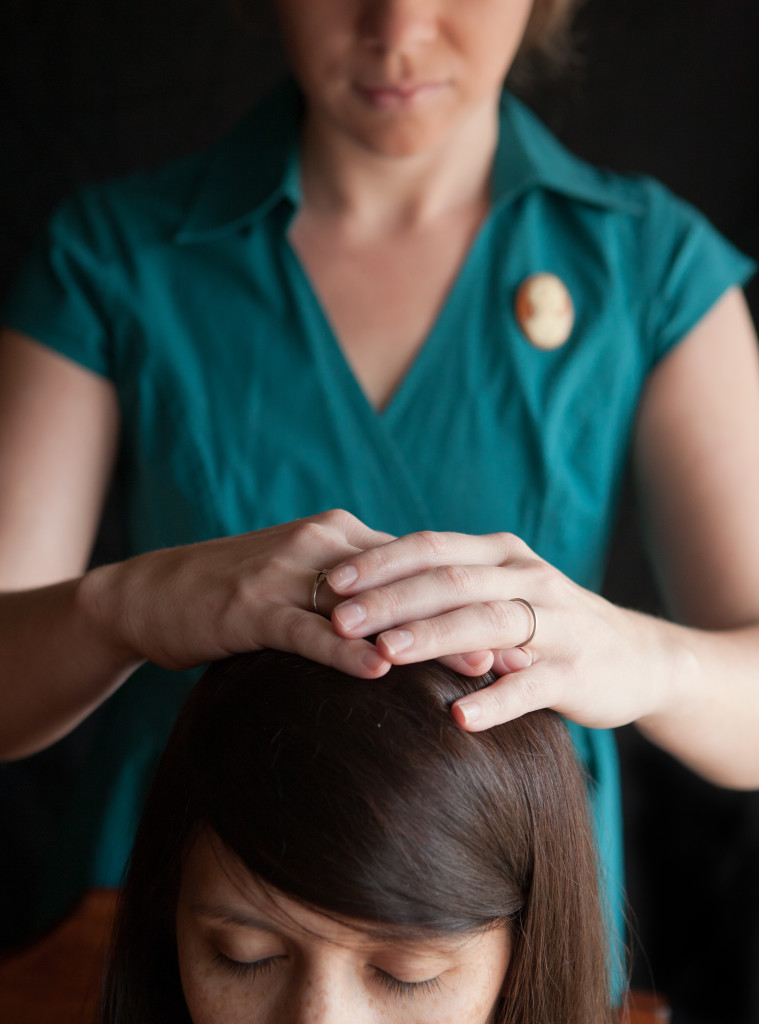
In Memory Of Vada – Doubt your Doubts

I spent many hours today listening to General Conference. As is usual for me, I was especially touched by President Uchtdorf’s talks. A couple of his comments, combined with events in Salt Lake City tonight, coalesced to form the thoughts in this post.
As anyone who reads Mormon blogs, or Mormon-related news of any sort, is no doubt aware, many women (and some men) came together in Salt Lake City tonight and asked to be admitted into the Priesthood session of General Conference. The group that organized the action is called Ordain Women, and their whole purpose is to call upon the leadership of the LDS Church to ordain women to the Priesthood alongside men. Many of these women have great faith that this is something that will happen, even though it hasn’t yet.
I once shared that faith. For two-thirds of my life, I was certain that women would hold the Priesthood someday. I wasn’t sure why we didn’t yet, but I could accept the current fallen state of affairs. After all, black men had to wait until 1978 to hold the priesthood. I didn’t know whether there was a greater purpose for this, or it was simply the fault of the limited vision of the leaders of the church, but it was how it was, and those who waited faithfully, not knowing how long it would take for them to receive those blessings (or even if they ever would) were blessed when the Priesthood and temple blessings were granted to them. I always saw women’s ordination similarly (though we admittedly have it a little better, since we can already go to the temple). I didn’t know if there was a reason women had not yet received the Priesthood, or if our church leaders simply hadn’t asked yet, but it didn’t matter too much to me. I was content to wait.
Even with the waiting, I never doubted that women someday would receive the Priesthood. After all, I had been told my entire life that our purpose here on Earth was to become like God, and that someday we would be Priests and Priestesses, Gods and Goddesses, and create our own worlds. It’s a part of Mormon theology that has always resonated with me, possibly because I’m a writer and have spent my entire life creating worlds of my own. And it seemed obvious to me that women would have the Priesthood. After all, how could we be Priestesses without the Priesthood? How could we be Goddesses without the power of God? That made no sense. So obviously women would receive the Priesthood.
I maintained this certainty until I first went through the temple for my Endowment. It was a hard, troubling, doubt-inducing experience in many ways, but that’s not what I want to focus on here. It was, however, the first thing that ever made me question my view of the eternities. Maybe it wouldn’t be how I’d always pictured. Maybe we wouldn’t really be Gods and Goddesses, Priests and Priestesses, working together to create worlds of our own. Maybe women really were just an afterthought, not nearly as important to God as His sons. Maybe we wouldn’t really have the Priesthood, because maybe we wouldn’t really ever be equal partners.
Once this seed of doubt was sown, there was more than enough evidence to keep it growing. In the temple, in the structure of the worldwide church, in the structure of local wards, in the way women and men were talked to and about, everywhere I turned there was more evidence to tell me that the wonderful vision I’d embraced for most of my life was not a true vision of how things would be, that things in Heaven would be considerably less wonderful than I’d imagined. I tried to console myself with scriptures that talked of the glory of Heaven, and the thought that a loving Father wouldn’t create a Heaven that would be so painful for me and many of my sisters, but it was hard. It was hard to maintain faith in that, and many days I have despaired. There was a lot of talk about missionary work during Conference today, too, and that is an area I have struggled with. I struggle not because I’m afraid of what someone will think of me, but because as much joy as the gospel gives me, it imparts a lot of pain, too, and I have a hard time inviting someone I care about into that situation. It’s hard enough to live there myself.
But today I’m deciding to take courage. I’m choosing to lean on the faith of my sisters, who believe that women will be ordained. I’m choosing to, as President Uchtdorf instructed, “Doubt [my] doubts before [I] doubt my faith.” I had faith for many, many years that women would hold the Priesthood, and that we would work alongside men as equal partners. My doubts aren’t gone, but today I’m going to doubt my doubts rather than my faith. President Uchtdorf later said, “What had seemed impossible a moment before immediately became a reality.” I’m choosing to have faith that as dismal as things look to me today, they will change. As others have stated, the answer will continue to be no, until it is yes. Today I’m holding onto hope that the yes will come.
Seeing Yourself Matters
I am a geek. One of my favorite things to geek out over is Doctor Who. Last weekend I had the pleasure of sharing my obsession in a discussion about the Time Lord from Gallifrey on a panel at Salt Lake Comic Con. But this was no ordinary panel because we weren’t talking about your ordinary Doctor. No. This panel was about the fact that the newest actor to play The Doctor is Jodie Whittaker: a woman. For the first time, this timeless character will be portrayed as a woman. The panel at Salt Lake Comic Con was set to talk about the new casting, and the reaction.
But I don’t want to talk about the very predictable backlash from men who worried that this was just stunt casting or a cave to militant feminists (on behalf of all militant feminists, this wasn’t our goal, but we’ll take it!). I want to talk about my co-panelist—my 11-year-old daughter, Dory—and how excited she is to have a woman take the role of The Doctor.
You see, if you’re a girl geek, sometimes it can be tough to see yourself in the things you love. We can’t all be princesses who get their PhD at 16 and then go on to become a general. And we don’t all feel comfortable in a bustier like Wonder Woman. So, it was thrilling to see a new female character for girls to look up to. Seeing yourself matters. And if kids aren’t given the chance to see women as smart, capable, leaders then what are the chances they will become adults who believe women can be those things?
As I heard my daughter tell a room full of strangers that she “hopes The Doctor has a boy companion so I can watch her boss him around for a change” I laughed along with the rest of the audience. But I couldn’t help but think of all the people who will sit down to watch general conference this weekend, seeing only men as authorities, seeing men preside. What will they learn about women and the role they get to play?
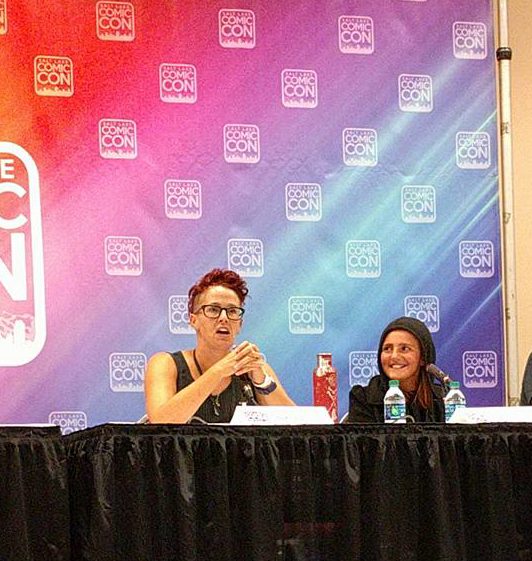
Make the Gosh Darn Cake
It has been five days since the LDS Church officially signed on to an amicus brief arguing that the Supreme Court should find in favor of a Colorado baker who refused to provide services to a couple based on their sexual orientation. This means it has been 72 hours since the leaders of the church we call home declared that they support the idea of discrimination. Which ultimately means that it has been 4,320 minutes since my church broke my heart. Again.
I cannot help but wonder if the leaders of the LDS church realize what they are telling us—the people who live under their influence or sway—every time they dive into this debate. They are telling us that we have no obligation to respect others. They are telling us that any public move by the church to appear accepting was simply a ploy. And they are telling us that love is conditional.
LDS Church leaders have been creative in finding ways to disrespect our LGBTQIA+ siblings. These men have brought more hurt and pain to people whose only offense is the desire to feel love. The result of these efforts has left both a figurative and literal body count. I can do two things in my own attempt to counter this campaign: speak out and pray. I hope you will join me in doing both.

Image credit: Jerilyn Hassell Pool
Excommunication and Female Ordination
My thoughts are with Elder Hamula and his family as they process his excommunication. This has brought back painful memories and I have cried over the news. Excommunication from the LDS Church is the most serious form of discipline.
As Elder Ballard described in A Chance to Start Over: Church Disciplinary Councils and the Restoration of Blessings, “Excommunicated persons are no longer members of the Church. Therefore, they are denied privileged of Church membership including wearing of the temple garments and the payment of tithes and offerings […] they are not entitled to offer public prayers or give talks. They may not hold a Church position, take the sacrament, vote in the sustaining of Church officers, hold a temple recommend, or exercise the priesthood.”
It still surprises me that the time a person needs community and the blessings of communal sacrament the most is when they are rejected and denied it. When a person is excommunicated, yet is still a believer, there are serious psychological consequences when a perceived eternal family member is removed from the family.
I know this, because I lived this. As I have mentioned before, my father was excommunicated on Easter Sunday when I was 14 years old. He was not fully reinstated into the Church until I was an adult and was already sealed to another priesthood holder, my husband. For an extended period our family did not have an ordained priesthood holder in our home; I had no brothers or close male family members that I could rely on for priesthood access. My mother, two sisters, and I learned to navigate LDS patriarchy without an ordained patriarch. There were many injuries along the way—stories that are not mine to share. However, I know what is feels like to be shunned, ignored, avoided, rejected, pitied, and patronized by my community for mistakes that had nothing to do with me.
I have written about my concerns of being a member of a patriarchal religious community here, here, here, here, here, here, here, here, here, here, here, here, and here. I have written about it at Feminist Mormon Housewives, Ordain Women, Rational Faiths, and The Transfigurist. I have discussed it at A Thoughtful Faith Podcast, and the Mormon Transhumanist Association Conference. I will keep voicing this concern until this issue gets resolved. People, often women, are still unnecessarily suffering at the hands of patriarchy, especially in regards to excommunication.
It has been over 20 years since my father’s excommunication, and our family is still healing from the trauma. For me, part of that healing processes is ordaining women to the priesthood. Women cannot receive the fullness of the gospel and full participation of the LDS community without it. There is no other way. We are taught to be self-reliant, but are denied the tools to do it. We are taught we have priesthood authority, but are denied ordination. We are taught to give our time, talents, and service, but we are denied our fullest, sincerest participation. We are taught to nurture, care for, teach our children, but we are denied full participation in their priesthood ordinances.
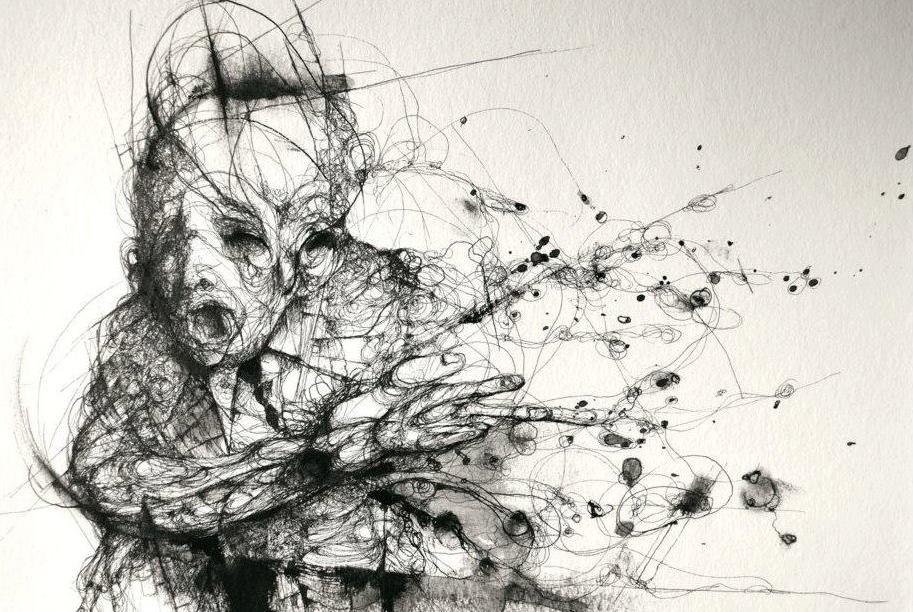
My mother could not baptize us, confirm us members of the Church, give us blessings of healing, stand as a witness at my temple sealing, or fully participate in priesthood rituals with her six grandchildren. There is no reason why she shouldn’t be able to have the communal priesthood authority to bless the lives of her children and grandchildren. There is no reason she should have to ask another man to come into our home to bless her three daughters when she was a worthy and capable woman.
This is not about shaming anyone, airing dirty laundry, or sharing intimate details about people’s personal lives, history, or mistakes. This is meant to illustrate there is real harm in the patriarchal governance of the LDS Church, especially in relation to excommunication. The same mistakes keep happening. Women are still hurting due to the faults of patriarchal priesthood holders. Women are still denied LDS autonomy and it won’t change until we confront these issues openly, honestly, and compassionately. Change happens when a person in the community is brave enough to raise their hand and say, “Something bad is happening to me and it’s not my fault. Please, let’s fix this.” Change doesn’t happen when the community responds by saying “Put your hand down. You’re being negative when you should have more gratitude. Your experiences and concerns aren’t worthy of consideration or can be patronizingly placated.” Change happens when people acknowledge that real people in their community are silently suffering due to inequitable policies and power imbalances. I do not think female ordination will solve all of our problems with regards to excommunication, but it’s a start.
As for Elder Hamula, the details of his or anyone else’s excommunication are none of our business (unless law enforcement is necessary). Being excommunicated from the LDS Church can bring a complete sense of loss and hopelessness. I’m not being melodramatic when I say the disillusionment of eternal family sealings can bring people to absolute meaninglessness and suicide. I hope the Hamula family will find healing and comfort with one another. My heart bleeds with them, especially his family members that will suffer from this through no fault of their own. Elder Hamula and his family have a long road ahead of them, and I offer my solidarity, love, and support.
What is Real and What is Misunderstood
Only two weeks ago I read with delight the talk from Eva Witesman of BYU: the one that progressive Mormons were heralding it as a golden message encouraging young women to gain an education and fulfill their potential. The talk resonated with me because, as a teen, I had been drawn to the church partially because of the Young Women Value Knowledge what I believed was a challenge to gain as much education as I could.
So, it was with excitement that I saw Witesman’s most recent attempt at sharing wisdom. This time it was an op-ed in the Deseret News. My excitement lasted one sentence. Then I got to the second sentence that implied that women who leave the church are following “a secular, godless, power-driven reality… better suited to our intellects, our ambitions, our self-respect.”
And the hits kept coming. Witesman dismisses the very real struggles women in this church face. She implies that they fall for “pretty lies” and “empty promises.” She claims they experience “a lonely, cold, confusing emptiness.” And she uses that gem “counterfeit” that has been used to describe non-traditional families.
Look. Lots of strong, intelligent, accomplished women stay in the LDS Church. And many of them do so happily, sharing Witesman’s confidence in their divinity and power. I respect that decision and the women who make it. It is unfortunate that Witesman doesn’t seem willing to give that kind of respect to women who leave. Women who leave the LDS Church do so for myriad reasons ranging from the destructive and continuing doctrine of polygamy, countless inaccuracies in what is presented as our history, a lack of transparency from general authorities and leaders, and cultural pressure to choose between professional and personal goals.
Leaving the church is not a result of, as Witesman claims, not knowing the difference between “what is real, and what is misunderstood.” For many women, leaving the church is the end result of a painful journey that includes fear of losing their friends, family, and community. And many do lose some or even all of those things. But they feel called to leave in order to fully become their true selves.
I’m sure what Witesman wrote reflects her own experience. The problem is that, in doing so, she dismisses the experiences of others, and she does so using hurtful and disrespectful language. For some reason, it seems, Witesman chose to diminish other women in order to defend herself. And that falls far short of several other Young Women Values I learned as a teen: Individual Worth, Good Works, and Integrity.
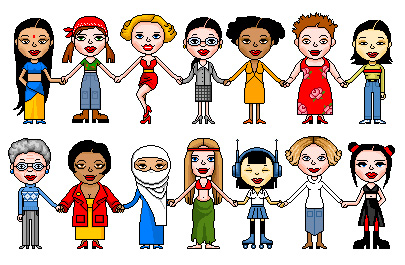
Getting the Priesthood Story Straight
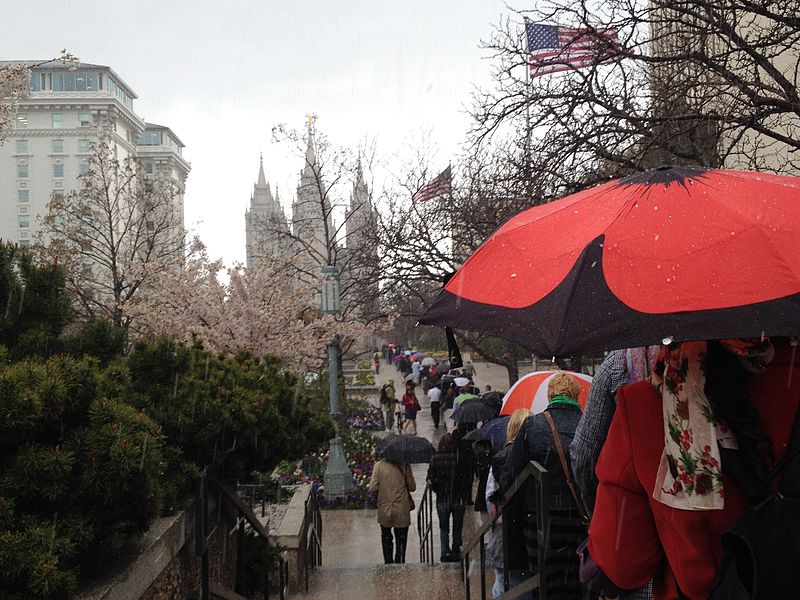
In the years that I have been engaged in openly and publicly advocating for female ordination in the LDS church, one of the most common responses from men and women in the church comes along the lines of, “if you want extra meetings on Sundays, I’d gladly trade you,” or “I don’t know why you would want even more responsibility, women already do everything!” Never mind these statements are contradictory (do women in the church have more free time or less free time than the men, exactly?) it has never stopped being remarkable to me that this is what the Power of God on earth is reduced to when I express a desire to access it.
It’s funny because when I listen to or read talks from the “priesthood” session of conference, there is a different theme:
Brethren, our ordination to the priesthood is an invitation from the Lord to walk with Him. And what does it mean to walk with the Lord? It means to do what He does, to serve the way He serves. –Eyring, April 2017
Many things may help strengthen our younger brothers to rise up in the priesthood, but nothing will be more powerful than our helping them develop the faith and confidence that they can draw on the power of God in their priesthood service. – Eyring, October 2016
Think of this: the priesthood conferred upon us is the very same power and authority through which God created this and numberless worlds, governs the heavens and the earth, and exalts His obedient children. – Nelson, April 2016
Let’s please decide once and for all what being a Priesthood Holder ™ really means. It either means you have access to the Power of God and this edifies you and everyone around you, or it just means you have access to leadership positions in the church that take a lot of time and effort.
Maybe both? But then one or the other cannot be used to dismiss my desire to be a part of it.
To be clear, I’ll continue to advocate for access to it either way. Women need to stand with men shoulder to shoulder both spiritually and within the hierarchy, if the church is ever to achieve full gender parity. But, you should get your story straight.
This post originally appeared on Rational Faiths.
Laura Petrie and the C.O.B.
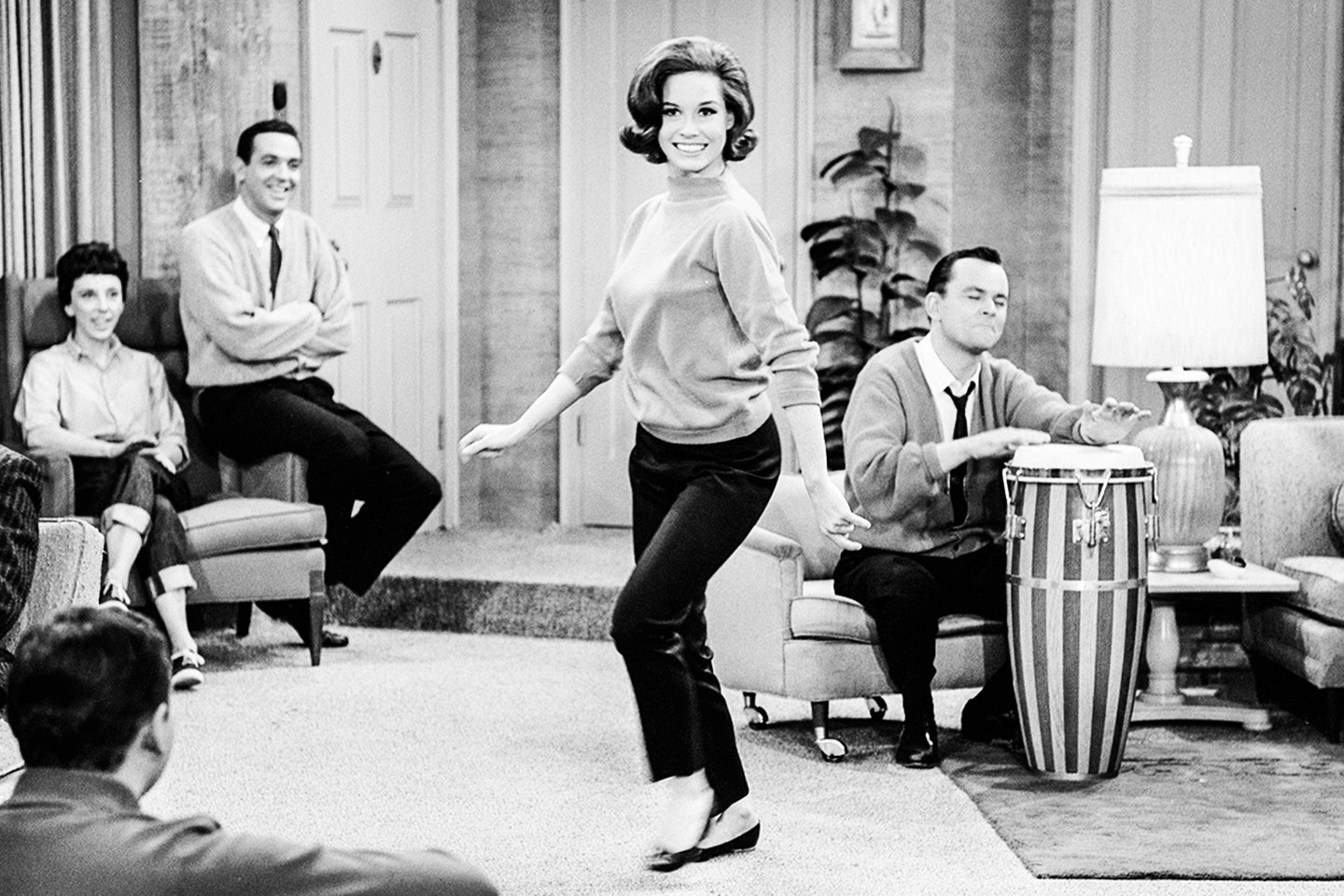
Photo credit: Vanity Fair
It was with interest and a hint of a head shake that I listened to the news that women would be allowed to wear pants or pantsuits to work at the Church Office Building and other Church-owned places of business. Having never worked for the LDS Church myself, but knowing several women who did, this was an issue I had heard about for years but was not personally invested in. It felt like an important moment for those other women—and the men who can now remove their suit jackets on hot days—and I celebrate this for them.
I can’t, however, help but notice that it is 2017. It has been almost 25 years since women in the United States were given permission to wear pants on the Senate floor. It’s been 50 years since Lucille Ball and Mary Tyler Moore rocked capris on television. And it was less than five short years ago that Mormon women united to wear pants to church in symbolic solidarity with each other. And here we are, well into the 21st century, and our culture is now moving toward the idea that women can be respectful and professional without a strictly prescribed gendered dress code.
So, I celebrate that, in our community, women will be allowed to make clothing decisions. (I’m also pretty stoked about the paid family leave. But I digress.) I recognize the shift in thinking and open-mindedness that had to come before this decision could be made. And I hope that this is a small step toward more trust for women in all areas.








